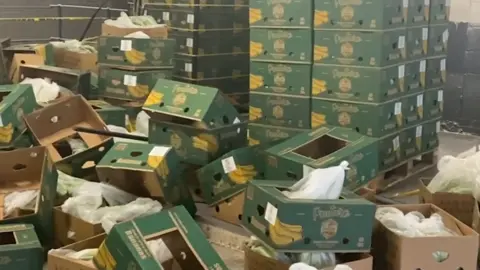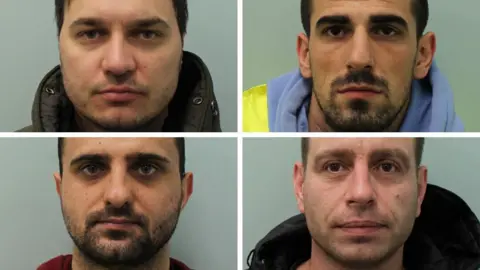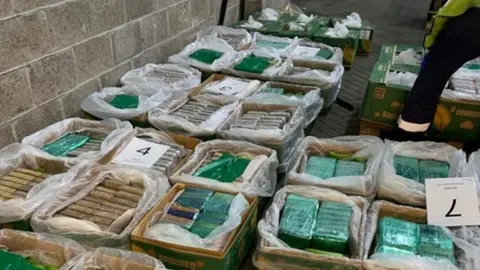 NCA
NCAA gang has been convicted after trying to smuggle cocaine with a street value of about £200m into the UK inside a shipment of bananas from South America.
A long-running court process has ended allowing the BBC to reveal how police cracked the case – believed to be one of the biggest drug seizures ever seen in the UK – and how undercover officers posed as lorry drivers to foil the gang in February 2021.
Petko Zhutev, Ghergii Diko, and Bruno Kuci pleaded guilty to smuggling the shipment into the UK while Erik Muci and Olsi Ebeja were found guilty of their involvement following a trial at the Old Bailey.
On Friday, Judge Rebecca Trowler KC adjourned sentencing to November 11.
The cocaine was intercepted by officers having arrived in the UK from Colombia.
On the face of it, the importer Agro Food Ltd seemed like any other regular company dealing in the trading of fruit that is grown in other countries but consumed by British shoppers.
It had spent five years importing and exporting fruit and vegetables, but the firm changed hands in December 2020. And a man called Petko Zhutev, who had not long been in the UK, was appointed as the company’s director.
Police told the BBC this case was an example of criminals with an ulterior motive taking over a well-run business that was already established in the importing and exporting of produce and less likely to arouse suspicions.
The legitimate business gave this gang “an extra layer of protection”, one undercover officer said, adding it is one of the new methods gangs have been using to get drugs into the UK.
In February 2021, Bulgarian national Zhutev signed for an expected delivery of bananas to the company’s warehouse, in north London.
The 41 pallets of bananas had just been shipped to Portsmouth on a cargo ship from Colombia and then delivered by lorries to London.
Unbeknown to Zhutev and two other associates – Diko and Kuci – the real contents of the shipment had already been intercepted by the UK’s Border Force and officers from the National Crime Agency (NCA) on its arrival at Portsmouth.
Officers had acted on intelligence and tracked the movements of two previous shipments in the lead-up to the seizure which officers described as “dry runs”.
The first attempted shipment was rejected at Dover by the Department for Environment Food and Rural Affairs (Defra) but a second shipment went through leading to the gang loading the third shipment with the drugs.
Inside the containers were more than 2,330 blocks of cocaine – each weighing around 1kg and valued at £30,000 per block. “This was a significant seizure,” John Coles, who leads the NCA’s specialist operations, told the BBC.
“One of the biggest ever.”
 National Crime Agency
National Crime AgencyOfficers had to act fast if they wanted to find those responsible, catch them in the act and “frustrate” them.
The crates containing the cocaine were replaced with dummy crates, and the cocaine replaced with real bananas. Some of the boxes were bugged with audio devices.
Two undercover officers acting as lorry drivers were then tasked with taking the load up the A3, from Portsmouth to the warehouse in Edmonton, north London.
Once there, Zhutev met them and appeared to show he was the man in charge. He helped the drivers park, then inspected the containers and signed for them.
While he, Diko and Kuci were inside, specialist counter-terrorism firearms officers from the Metropolitan Police smashed down a door to the industrial unit.
Of the 41 crates of banana boxes – four were clearly put to one side. Police say they were the dummy crates, which bore the same resemblance and bar codes as the ones that had been intercepted.
 NCA
NCA“We basically watched the criminals open up the particular parts of the consignment, where we knew the cocaine had been hidden and where we knew they thought it was,” Mr Coles said. “At that point our officers went in and arrested them.”
Various boxes, mobile phones, empty suitcases and a loaded black Turkish Ozkursan revolver were found as officers searched the warehouse.
Zhutev, Diko and Kuci were all arrested and subsequently charged with importing Class A drugs, as well as possessing a firearm and ammunition with intent to endanger life.
Diko and Kuci pleaded guilty to the charges, but Zhutev denied any involvement and was cleared of the firearm and ammunition offences after a trial at London’s Old Bailey last summer.
Jurors failed to reach a verdict on the drugs importation charges and a retrial took place this summer. Zhutev changed his plea to guilty in September.
Muci, who the NCA described as one of the scheme’s principle organisers, was found guilty of smuggling and supplying Class A drugs after a trial which ended on Thursday.
Ebeja – who the NCA says was the intended lookout and driver for the drugs – was found guilty of smuggling Class A drugs at the same trial, but the jury failed to reach a verdict on the charge of supplying them.
Judge Trowler lifted a reporting restriction on the verdicts after the prosecution announced it would not seek a retrial on the outstanding charge.
Mr Coles said there was nothing to suggest the previous owners of the Agro Food Ltd had any knowledge of the criminal activity.
He said neither Zhutev, Kuci or Diko had much of a “footprint” in the UK.
Mr Coles added Zhutev had been determined to smuggle cocaine into the UK and “came here specifically for that purpose”, finding a legitimate company to purchase.
On the face of it, he said the company then continued trading in the same way, but added: “Instead, they used it to hide the importation of cocaine.”
The prosecutor said: “The Crown rely on the absurdity that lies within the suggestion that an organised criminal gang would hand drugs valued at a street value of £200 million into the possession of a man who had absolutely no idea it was due to arrive.”
Evidence read out in court suggested Zhutev, Diko and Kuci were set to spend days unpacking, repacking and distributing the drugs.
Det Supt Simon Moring, from the Met Police said the huge shipment would likely to have been cut up and sold in more than 2.3 million deals. “That cocaine would have spilled onto the streets of London, which would have had an effect on organised crime.”
He added: “We know the knock-on effects – we know it’s going to cause violence amongst organised criminals.”
Last year, a United Nations report found global cocaine production was reaching record levels.
It said: “Albanian-speaking groups have been found operating wholesale cocaine distribution in many parts of Europe, particularly in the United Kingdom and the Netherlands.”
Those gangs manage drug networks across Europe and form “direct relationships with suppliers in Latin America”. It described the UK as an “important destination” for drug gangs.
Mr Coles said officers were working closely with colleagues in other countries, particularly in South America, to try to tackle the problem.
In recent years, officers have stopped importations of drugs which have been hidden inside broom handles or disguised as baby milk or charcoal.
Reflecting on these latest convictions, Mr Coles said this case was an example of the evolving battle officers face to tackle the UK’s drug trade.
“There’s lots of different ways they will find to import drugs to the United Kingdom,” Mr Coles said – noting the usage of a previously reputable business.
“So this is one model. There’ll be other models, and probably, now that we’ve dealt with this one, they’ll find another way of doing it.”

